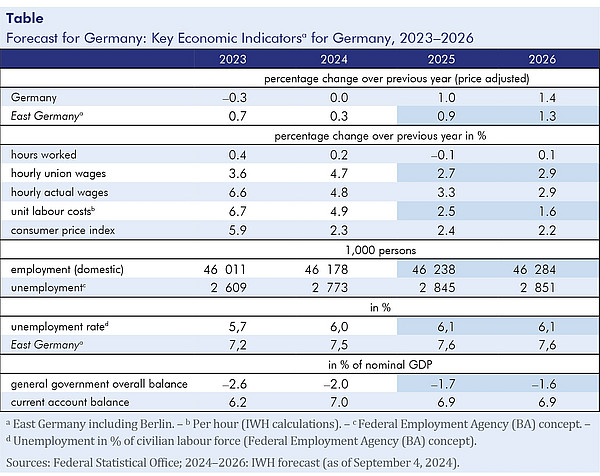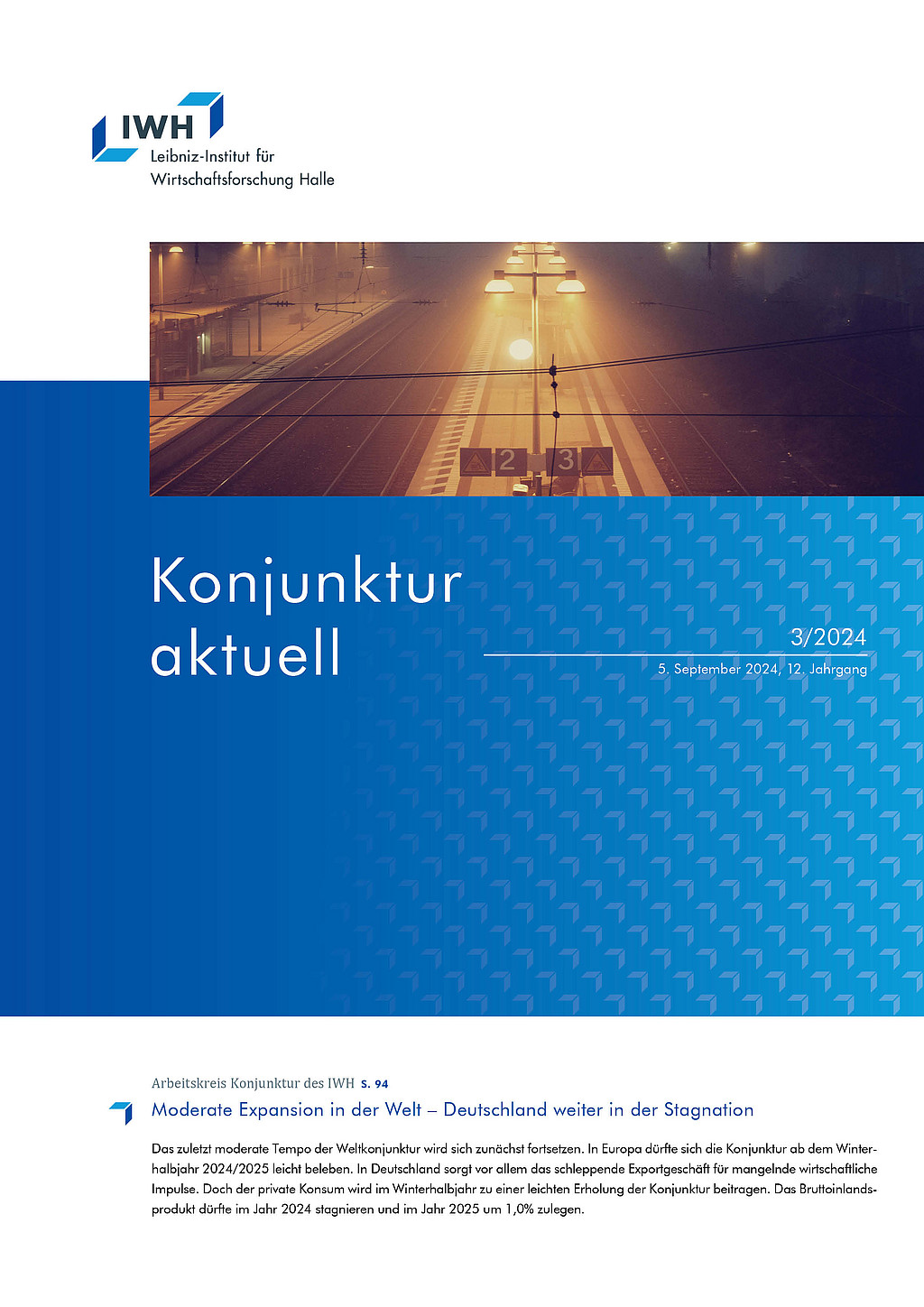Moderate economic growth in the world – German economy continues to stagnate

At the end of summer 2024, the recent moderate pace of the global economy appears to continue. Although concerns about the US economy led to severe turbulence on the financial markets at the beginning of August, positive news calmed the markets again shortly afterwards. The US Federal Reserve and the European Central Bank are likely to cut their key interest rates in September. Although fiscal policy in the advanced economies is slightly restrictive, the degree of restriction is likely to decrease. Global trade in goods, which has been stagnating for some time, has picked up again slightly since the spring. However, domestic demand in China is likely to remain weak, and the pace of expansion in the US is likely to slow, although the risk of a recession is not too high. The European economy is likely to pick up slightly in the winter half-year 2024/2025 as real wages rise.
Gross domestic product (GDP) in Germany fell slightly in the second quarter of 2024, with gross fixed capital formation down by 2.2% and private investment in equipment plummeting by 6.2%. Investment in equipment relative to GDP is significantly lower than before the pandemic. “One important reason for this is the long-term deterioration in export prospects, as Germany’s share of global goods exports has fallen significantly,” says Oliver Holtemöller, head of the Macroeconomics Department and Vice President at the IWH. “It is a considerable blow to the German economy if growth impulses no longer come from successes in the export sector.” The savings rate of private households has risen again slightly. This is probably due to concerns about the economic future. However, real wage incomes are rising due to relatively high wage dynamics and a slowdown of inflation. “A renewed upward trend in private consumption in the winter half-year should therefore contribute to a slight economic recovery in Germany,” says Oliver Holtemöller. The number of people in employment will remain roughly constant in the second half of 2024 and increase slightly in 2025. Consumer price inflation will average 2.3% in 2024 and 2.4% in 2025 because there will probably be no more dampening effects from a fall in energy prices. The general government deficit in relation to GDP will decrease from 2.6% in 2023 to 2.0% in the current year and 1.7% in 2025.
A considerable risk for the German economy lies in the widespread pessimism among firms regarding their earnings prospects. If the flow of negative surprises regarding the economic situation continues in the near future, sentiment is likely to deteriorate further according to the IWH researchers. “This would affect private investment activity in particular and prevent the gradual stabilisation in the coming quarters assumed in this forecast”, economist Oliver Holtemöller says. In addition, German export industries would be affected by a deterioration in the global economy, which could be triggered by a slowdown in the US or bad news from the various geopolitical trouble spots.
The extended version of this forecast contains two boxes (both in German):
Box 1: On the latest revision of the national accounts
Box 2: On the estimation of potential output
Publication:
Drygalla, Andrej; Exß, Franziska; Heinisch, Katja; Holtemöller, Oliver; Kämpfe, Martina; Kozyrev, Boris; Lindner, Axel; Mukherjee, Sukanya; Sardone, Alessandro;; Schultz, Birgit; Zeddies, Götz: Konjunktur aktuell: Moderate Expansion in der Welt – Deutschland weiter in der Stagnation. IWH, Konjunktur aktuell, Jg. 12 (3), 2024. Halle (Saale) 2024.
New data set: The IWH Forecasting Dashboard (ForDas) is an interactive platform for comparing macroeconomic forecasts from various institutes on the German economy.
Whom to contact
For Researchers

Vice President Department Head
If you have any further questions please contact me.
+49 345 7753-800 Request per E-MailFor Journalists

Head of Public Relations
If you have any further questions please contact me.
+49 345 7753-765 Request per E-MailIWH list of experts
The IWH list of experts provides an overview of IWH research topics and the researchers and scientists in these areas. The relevant experts for the topics listed there can be reached for questions as usual through the IWH Press Office.
Related Publications

Moderate economic growth in the world – German economy continues to stagnate
in: Konjunktur aktuell, 3, 2024
Abstract
<p>The recent moderate pace of the global economy will continue for the time being. In Europe, the economy is likely to pick up slightly from the winter half-year 2024/2025. In Germany, the sluggish export business in particular is providing a lack of economic impetus. However, private consumption will contribute to a slight economic recovery in the winter half-year. Gross domestic product is likely to stagnate in 2024 and grow by 1.0% in 2025.</p>



